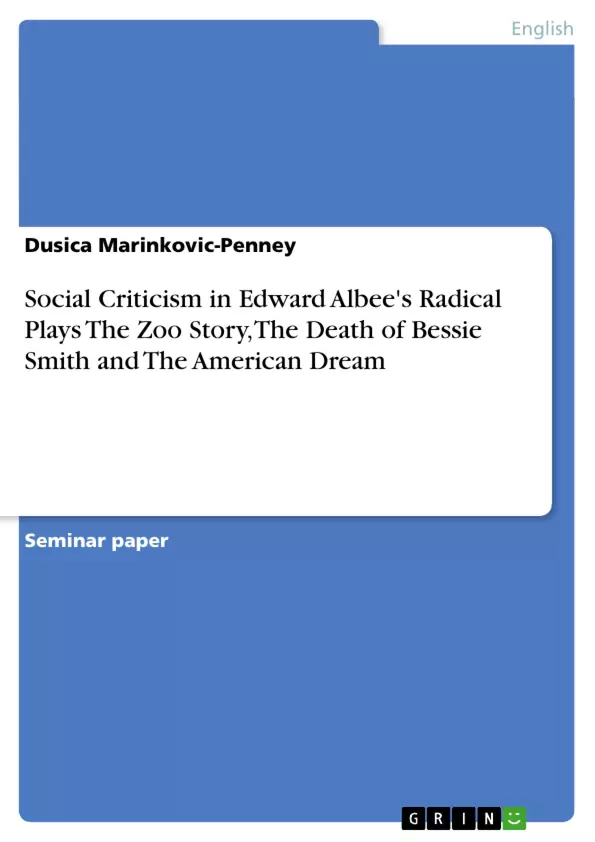All three plays The Zoo Story, The Death of Bessie Smith and The American Dream are Edward Albee’s early plays in which he points out the deplorable state of the American society. Albee’s way of writing is provocative because his ultimate goal is to shock his audience. At the same time he wants to amuse the viewers with dialogues that are governed by sarcasm and irony. He writes in the preface of the play The American Dream: “Is the play offensive? I certainly hope so; it was my intention to offend- as well as amuse and entertain.” (p.14) Thus his plays manages to confront the audience with the harsh reality of life and the problems of modern society.
In The Zoo Story a clash of two different representatives of the modern American society takes place and ends up in an accidental manslaughter. In The Death of Bessie Smith the audience faces a society ruled by hatred, racism and frustration. The third play which is going to be examined closely in this paper is The American Dream, a sad portrait of an American family craving for something to replace the emptiness they find themselves in.
This paper will examine the social criticism in these three plays which were written between 1958 and 1960 in order to find common topics and critical issues which were present at that particular time, and are still relevant today. The topics that are going to be analyzed are the outcasts of the society and their treatment by the members of the establishment, the lack of communication and growing violence as a result of it and finally the artificial values of the modern society and the constantly present hypocrisy and double standard.
As Edward Albee sums it up:
The play [The American Dream] is an examination of the American scene, an attack on the substitution of artificial for real values in our society, a condemnation of complacency, it is a stand against the fiction that everything in this slipping land of ours is peachy-keen. (p. 13-14)
Inhaltsverzeichnis (Table of Contents)
- TOPIC: Social Criticism in Edward Albee's Radical Plays
- Introduction
- Social Criticism in Edward Albee's Radical Plays
- Establishment vs. Outcasts of the Society
- Lack of Communication and Violence in the Modern Society
- Hypocrisy and the Pursuit of Artificial Values
- Conclusion
Zielsetzung und Themenschwerpunkte (Objectives and Key Themes)
This paper examines the social criticism presented in three early plays by Edward Albee: The Zoo Story, The Death of Bessie Smith, and The American Dream. It aims to identify common themes and critical issues prevalent in American society at the time of their writing (1958-1960), and to explore their continued relevance today. The analysis focuses on the ways in which Albee utilizes his plays to expose and challenge the societal norms and values of his time.
- The clash between the established social order and marginalized individuals
- The breakdown of communication and the rise of violence in modern society
- The pursuit of artificial values and the prevalence of hypocrisy
- The impact of racism and prejudice on individuals and society
- The search for meaning and fulfillment in a seemingly empty and materialistic world
Zusammenfassung der Kapitel (Chapter Summaries)
- Introduction: This chapter provides a brief overview of Albee's early plays and his style of writing, which is characterized by provocation and social commentary. The chapter introduces the three plays that are the focus of the paper: The Zoo Story, The Death of Bessie Smith, and The American Dream. It also outlines the main topics and critical issues that will be analyzed throughout the paper.
- Social Criticism in Edward Albee's Radical Plays: This section examines the social criticism presented in Albee's three plays. It delves into the themes of establishment vs. outcasts, lack of communication, and hypocrisy.
- Establishment vs. Outcasts of the Society: This subsection explores the dynamics between established members of society and marginalized individuals in Albee's plays. It analyzes how the characters represent different social groups and the ways in which their interactions highlight societal inequalities and prejudices.
- Lack of Communication and Violence in the Modern Society: This subsection focuses on the breakdown of communication and the emergence of violence in Albee's portrayal of modern society. It explores how characters struggle to connect with each other and how this lack of understanding contributes to conflict and ultimately, violence.
- Hypocrisy and the Pursuit of Artificial Values: This subsection examines Albee's critique of artificial values and hypocrisy in American society. It analyzes how characters seek superficial fulfillment and how their actions reveal a disconnect between outward appearances and inner realities.
Schlüsselwörter (Keywords)
Key terms and concepts explored in this analysis include social criticism, radical theater, American society, establishment vs. outcasts, communication breakdown, violence, hypocrisy, artificial values, racism, prejudice, and the search for meaning.
- Quote paper
- Dusica Marinkovic-Penney (Author), 2004, Social Criticism in Edward Albee's Radical Plays The Zoo Story, The Death of Bessie Smith and The American Dream, Munich, GRIN Verlag, https://www.grin.com/document/27689



